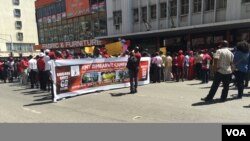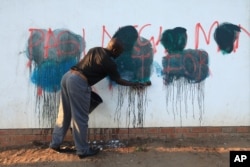A day after a lower court in Zimbabwe upheld a month-long ban on anti-government street protests, opposition and civil society groups are appealing the decision to the country's highest judicial body, the Supreme Court.
Politician Tendai Biti, with Zimbabwe Lawyers for Human Rights, Wednesday filed the appeal. The move came after the High Court of Zimbabwe dismissed an application that called into question the legality of the ban imposed by police.
"Quite clearly, the judgment of the High Court is wrong," he said. "So we are entitled to appeal. For constitutionalism, the right to protest as defined in our new constitution is so compelling such that I would not think that any court would refuse the insurmountability of those arguments."
Last month, the High Court ruled that an earlier ban on the protests in Harare was "invalid" because it was not done procedurally. That decision led to the second ban, which was upheld Tuesday.
Before the bans, Zimbabwe had been rocked by an unprecedented wave of protests calling for President Robert Mugabe’s government to fix the moribund economy and respect human rights. Police then resorted to force and arrests to quell the protests.
Activist Linda Musarira was released last week after spending 82 days in jail for protesting. Musarira said she thinks it is time to change strategy to challenge the 92-year-old president's leadership.
“The demonstrations have failed, people are being beaten up, people are being abused. Why should we continue with a strategy which is making people get into situations that we do not want? We are fighting against those injustices.
The constitution allows us to demonstrate, but they are unleashing the reign of terror using police officers and state security agents against activists so that they instill fear in us so that they silence us. But we will not be silenced. We are tired of this regime. We want change; we want to restore Zimbabwe back as the breadbasket of Africa,” Musarira said.
Hunger and poverty are two of the issues that have brought Zimbabweans into the streets since July. The country has about a quarter of its 13 million population depending on international aid for survival.





